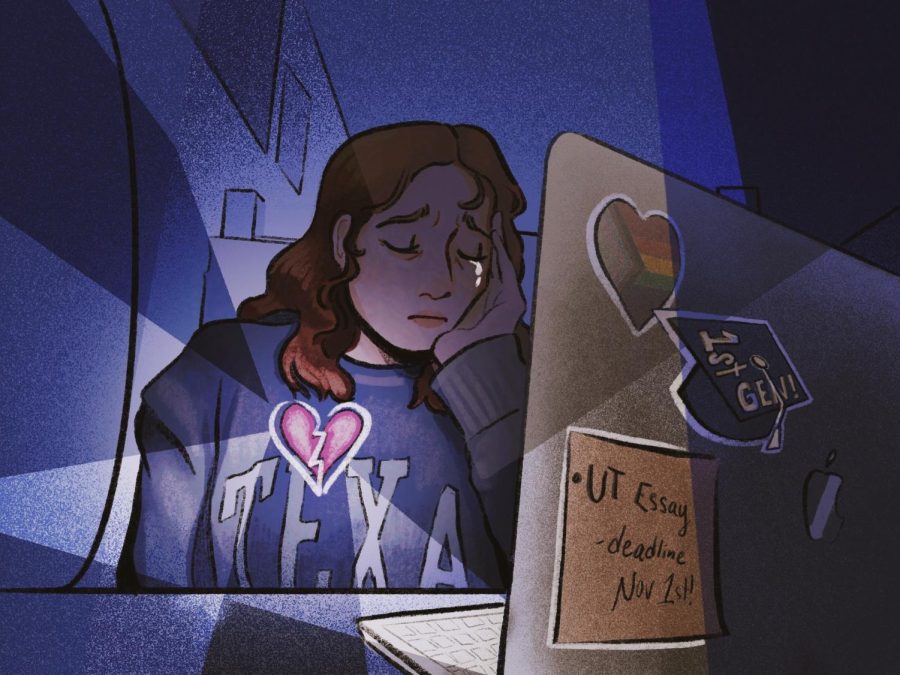I regret trauma dumping in my admissions essay
November 8, 2022
“What is a hardship that you have overcome, and what did it teach you?”
Where do I even start? There was the time I got cut from the varsity dance routine, my first breakup or perhaps bombing my AP U.S. History exam. But that wasn’t what college admissions prompts were looking for. My college advisor told me that wasn’t going to make me marketable to my dream school.
Coming from an immigrant household and a high school with over 80% of its students being economically disadvantaged, I was always told my grades and background were my ticket to higher education. I have never been ashamed of roots, but exposing the fear of my parents getting deported and how I combated racism at the ripe age of 12 in a 600-word essay felt like “selling out.”
Receiving my acceptance letter from UT is one of the proudest moments of my life. I had accomplished a lifelong dream, but I couldn’t fight off the twinge of regret knowing I “profited” from these haunting experiences.
The structure of college admissions essays often motivate “trauma dumping” just for admissions officers to decide our future in their schools. Because of this, some applicants may feel like they have to share painfully personal experiences in their application. UT should help alleviate this concern by adding different prompts that encourage students’ creativity and showcase themselves from a holistic perspective.
Multiple universities have taken steps to alleviate the pressure of having an emotionally heavy essay. The University of Chicago is notorious for asking creative essay prompts. Current students are even encouraged to submit ideas for creative prompts such as “What advice would a wisdom tooth have?” Chapman University, Lehigh University, Tufts University and the University of California, Berkeley are just some of the few institutions that offer creative prompts.
Prompts like these encourage applicants to think outside the box and showcase their unique perspectives. Characteristics like discovery and freedom are exactly what UT looks for in its future longhorns.
Kathleen Harrison, assistant director of communications for the Office of the Executive Vice President and Provost, said in an emailed statement that essay prompts are approved by the ApplyTexas Advisory Committee through the Texas Higher Education Coordinating Board.
“Short answer questions are designed to help identify students that would meet the criteria for their selected first-choice major,” Harrison said. “The optional short answer question for special circumstances is available for students to provide additional context to any part of their application.”
Students can also apply to UT through the Common App, which has a different set of essay prompts. The University requires three additional short answer questions, available on both the Common App and ApplyTexas.
Admissions essays can be a powerful tool to convey parts of one’s identity. While the question is optional, some people may feel pressured to share their experiences because they were told their background will get them into college. There are some applicants who feel comfortable sharing those experiences, and that’s perfectly fine. However, we cannot ignore the unspoken demand of exploiting our personal lives for the sake of getting into our dream schools.
Allowing applicants to choose how to showcase their strengths and capabilities through creative writing could give admissions officers a more holistic view of their applicant. Creative writing prompts promote problem solving, empathy and curiosity. Knowing applicants are capable of these traits should be more important than their personal history.
This issue isn’t about what people can and can’t write in their admissions essays. It’s really about how applicants choose to express themselves — to write a story they want to share, not one they feel pressured to write. Applicants deserve to feel confident in knowing whatever essay they write won’t hold them back from that precious acceptance letter.
Leon is a journalism sophomore from Houston, Texas.











